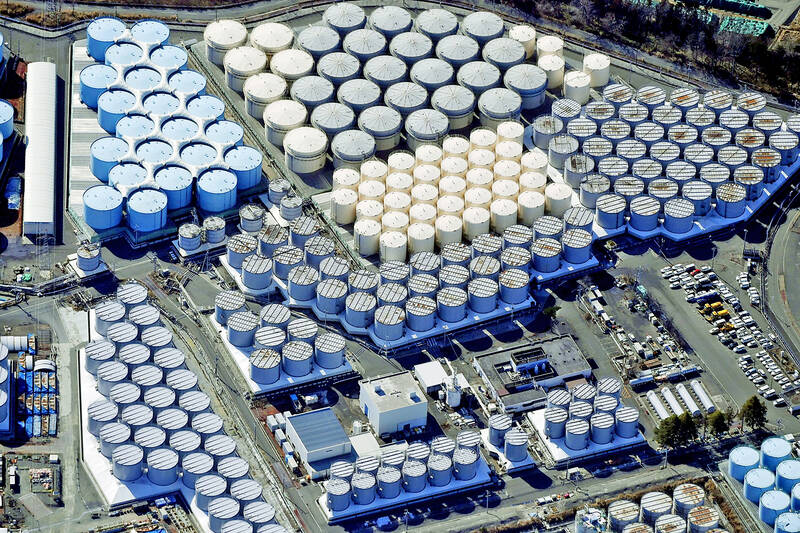Pacific island nations are urging Japan to delay the release of water from the wrecked Fukushima Dai-ichi nuclear power plant over fears fisheries would be contaminated, the Pacific Island Forum (PIF) said on Wednesday.
The Japanese government last week said that water from the Fukushima Dai-ichi nuclear power plant could be released into the sea “around this spring or summer,” raising concerns from island nations still grappling with the legacy of nuclear testing decades ago.
Japan approved the release of more than 1 million tonnes of water from the site into the ocean after treatment in April 2021.

Photo: REUTERS / Kyodo
The PIF, a regional bloc of 17 island nations, argues the release of the water could have a major impact on fishing grounds that island economies rely on, and where up to half of the world’s tuna is sourced.
“Our region is steadfast that there be no discharge until all parties verify it is safe,” PIF Secretary-General Henry Puna said at a livestreamed public meeting in Suva, Fiji.
“We must prevent action that will lead or mislead us towards another major nuclear contamination disaster at the hands of others,” he said, adding that Pacific islanders continued to endure the long-term impacts of nuclear testing on a daily basis.
The US conducted nuclear testing in the Pacific islands in the 1940s and 1950s, and the Marshall Islands continues to campaign for more compensation from Washington over lasting health and environmental effects.
France conducted atomic testing between 1966 and 1996 at Mururoa Atoll in French Polynesia in the southern Pacific Ocean.
Ken Buesseler, a scientist with the Woods Hole Oceanographic Institution, told the forum that a PIF scientific expert panel was urging Japan to reconsider the waste release because it was not supported by data and more information was needed.
Radioactivity moves across the ocean with currents and tides, and risks contaminating fish, he said.
A spokesperson for the US Department of State said Japan had examined several options to address “a unique and challenging situation.”
“Japan has weighed the options and effects, has been transparent about its decision and appears to have adopted an approach in accordance with globally accepted nuclear safety standards,” the spokesperson said.
“We look forward to the government of Japan’s continued coordination with the IAEA [International Atomic Energy Agency] as it monitors the effectiveness of this approach,” the spokesperson added.
The Japanese Ministry of Foreign Affairs previously said that regulators deemed it safe to release the water, which would be filtered to remove most radioactive isotopes, but would still contain traces of tritium, an isotope of hydrogen hard to separate from water.

A Chinese aircraft carrier group entered Japan’s economic waters over the weekend, before exiting to conduct drills involving fighter jets, the Japanese Ministry of Defense said yesterday. The Liaoning aircraft carrier, two missile destroyers and one fast combat supply ship sailed about 300km southwest of Japan’s easternmost island of Minamitori on Saturday, a ministry statement said. It was the first time a Chinese aircraft carrier had entered that part of Japan’s exclusive economic zone (EEZ), a ministry spokesman said. “We think the Chinese military is trying to improve its operational capability and ability to conduct operations in distant areas,” the spokesman said. China’s growing

Nine retired generals from Taiwan, Japan and the US have been invited to participate in a tabletop exercise hosted by the Taipei School of Economics and Political Science Foundation tomorrow and Wednesday that simulates a potential Chinese invasion of Taiwan in 2030, the foundation said yesterday. The five retired Taiwanese generals would include retired admiral Lee Hsi-min (李喜明), joined by retired US Navy admiral Michael Mullen and former chief of staff of the Japan Self-Defense Forces general Shigeru Iwasaki, it said. The simulation aims to offer strategic insights into regional security and peace in the Taiwan Strait, it added. Foundation chair Huang Huang-hsiung

PUBLIC WARNING: The two students had been tricked into going to Hong Kong for a ‘high-paying’ job, which sent them to a scam center in Cambodia Police warned the public not to trust job advertisements touting high pay abroad following the return of two college students over the weekend who had been trafficked and forced to work at a cyberscam center in Cambodia. The two victims, surnamed Lee (李), 18, and Lin (林), 19, were interviewed by police after landing in Taiwan on Saturday. Taichung’s Chingshui Police Precinct said in a statement yesterday that the two students are good friends, and Lin had suspended her studies after seeing the ad promising good pay to work in Hong Kong. Lee’s grandfather on Thursday reported to police that Lee had sent

BUILDUP: US General Dan Caine said Chinese military maneuvers are not routine exercises, but instead are ‘rehearsals for a forced unification’ with Taiwan China poses an increasingly aggressive threat to the US and deterring Beijing is the Pentagon’s top regional priority amid its rapid military buildup and invasion drills near Taiwan, US Secretary of Defense Pete Hegseth said on Tuesday. “Our pacing threat is communist China,” Hegseth told the US House of Representatives Appropriations Subcommittee on Defense during an oversight hearing with US General Dan Caine, chairman of the Joint Chiefs of Staff. “Beijing is preparing for war in the Indo-Pacific as part of its broader strategy to dominate that region and then the world,” Hegseth said, adding that if it succeeds, it could derail